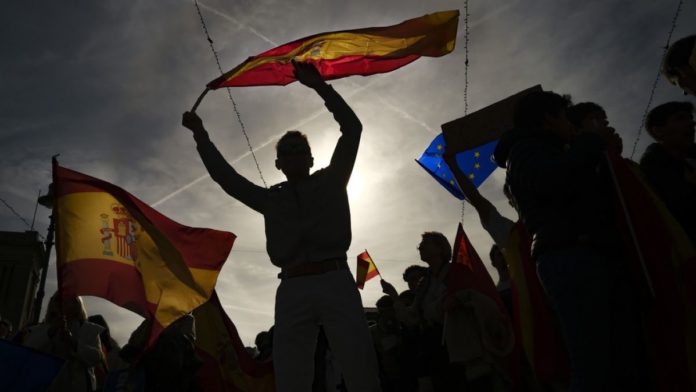The law could pave the way for the return of fugitive ex-Catalan president Carles Puigdemont.
Spain’s lower house of parliament is debating and voting on Tuesday on a hugely divisive amnesty law that aims to wipe away the legal troubles of potentially hundreds of people involved in Catalonia’s unsuccessful bid for independence in 2017.
Socialist Prime Minister Pedro Sánchez agreed to push through the law in exchange for parliamentary support from two small Catalan separatist parties -Esquerra Republicana and Junts per Catalunya-, allowing him to form a new minority left-wing government after Spain’s inconclusive general election.
The Conservatives, who won the most seats in the 2023 elections, failed to gain parliamentary support. It was then Sanchez’s turn, but without these two parties he would not have been able to form a government, meaning the country would have had to go to another election.
The bill, which is crucial to their support, could pave the way for the return of fugitive ex-Catalan president Carles Puigdemont – leader of one of the separatist parties – who fled Spain for Belgium after leading the failed illegal secession bid in 2017, which brought the country to the brink.
A key question is whether Puigdemont’s party can get clauses in the bill that would protect him from any legal challenges if he returns. If it can’t, it could shoot the bill down.
Puigdemont and the Catalan independence issue are anathema to many Spaniards, and the amnesty bill has raised the ire of the conservative and far-right opposition parties, which represent about half the country’s population. Many in the judiciary and police are also opposed, as are several leading figures in Sánchez’s own party.
Opposition parties have staged at least seven major demonstrations against the law in recent months.
Why is the law faltering?
The party of pro-independence leader Carles Puigdemont has announced that it will vote against the amnesty law unless its proposed amendments to ensure that all cases related to the secession bid are included and accepted.
The main stumbling block is the inclusion of terrorism cases in the amnesty law. Junts per Catalunya wants to protect Puigdemont and his involvement in the case investigating the activities of the pro-independence platform Tsunami Democràtic.
The judge of the Spanish Supreme Court in charge of the investigation wants to attribute terrorist crimes to two cases.
These are the events at Barcelona’s El Prat airport on 14 October 2019, when a protesting crowd collapsed the airport and a French traveller died of cardiac arrest and two police officers were seriously injured in the clashes.
Puigdemont’s party wants to change the wording of the law so that all terrorist crimes are amnestied.
What is next?
Even if the bill is finally approved on Tuesday, it is not known when the law could come into force, as it would have to go to the Senate, where the fiercely conservative leading opposition party, the Popular Party, has an absolute majority. The party has vowed to do everything in its power to block the bill in the Senate and challenge it in court.
After denying during his election campaign that the Socialists would grant the amnesty, Sánchez now says that the amnesty will be positive for Spain because it will further calm the waters in Catalonia.
Sánchez’s previous government pardoned several imprisoned leaders of the Catalan independence movement.
The vote must be approved by 176 lawmakers in the 350-seat lower house. Sánchez’s minority coalition has 147 seats, but in principle has the support of at least 30 more lawmakers.


